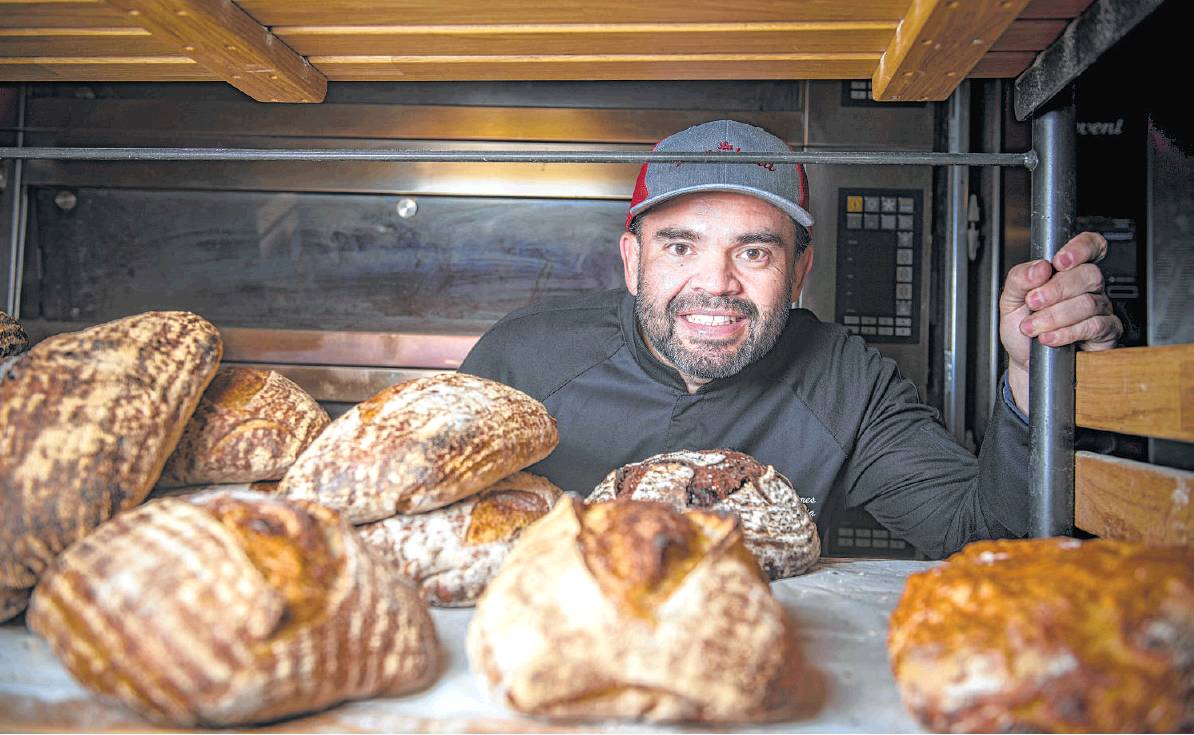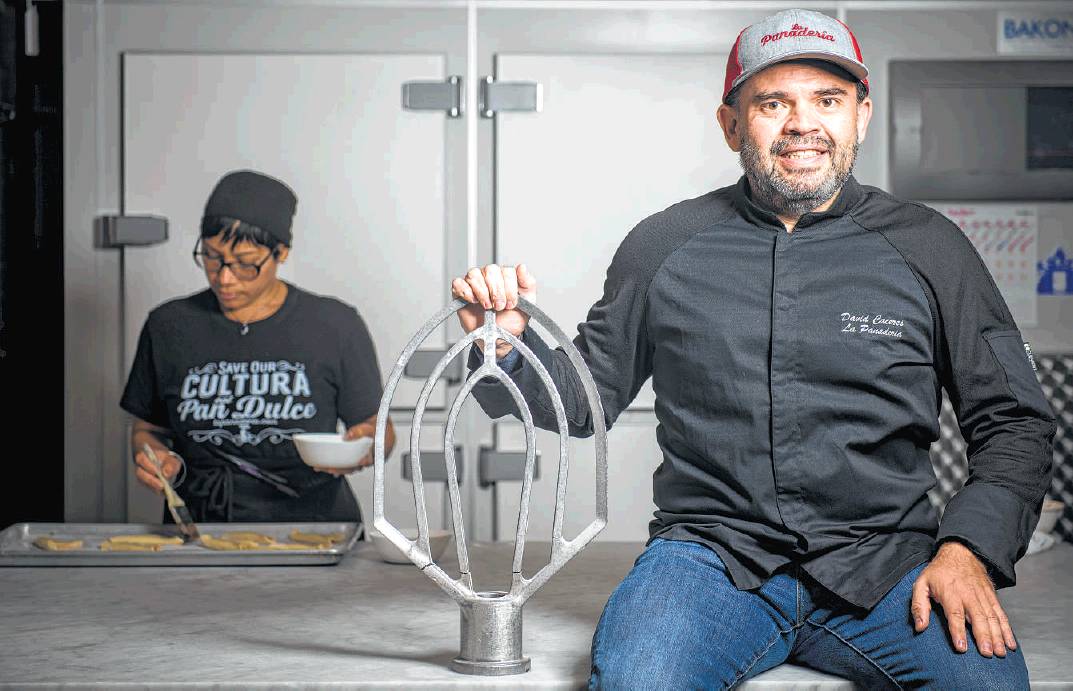TEXAS POWER BROKERS David Cáceres, co-founder of La Panadería
COMMITTED TO CRAFT OF BAKING
Brothers looking to add cafes in S.A. and beyond
By Diego Mendoza-Moyers STAFF WRITER
David and Jose Cáceres have been making a name for themselves in San Antonio in recent years through La Panadería, their nationally acclaimed bakery and cafe.
At either of two locations, patrons — compañeros, as the brothers call them — are met with tongs and a tray and go down the line, choosing from pastries ranging from buttery, crispy empanadas to tequila almond croissants before ordering the main course, such as the restaurant’s renowned tortas.
The bakery line, table decorations and general feel of the restaurants are all reminiscent of eateries in Mexico City, where the two were raised.
Five years after they opened the first La Panadería and two years since the second location opened downtown, the brothers have plans to expand again. They’re looking to open a third cafe, on the Northwest Side, next year, in addition to the downtown and Alamo Heights locations.
The brothers have aspirations beyond San Antonio, and possibly even beyond Texas. The key to that growth, David Cáceres said, will be continuing to commit to their craft, which is both a science and an art.
David Cáceres, 42, spoke recently with the San Antonio Express-News about the brothers’ success since starting their restaurant in 2014 and what they have planned moving forward. The following transcript has been edited for clarity and length.
Q: How have the last five years been for you since you and your brother opened the original La Panadería?
A: It has been a great journey. We opened our first brick-andmortar around five years ago, in April 2014. We were at the (Quarry Farmers and Ranchers) market, and we opened on a little corner on Broadway and Loop
410. Since that time, we expanded the store into the space next to us because we were sold out almost every day in the first year. We kept growing for three years. We were doing very well, and we decided to expand and open our second location in the heart of downtown on Houston and Navarro.
Q: What has the response been like at the downtown location since you opened about two and a half years ago?
A: It is a way bigger store — obviously, the amount of people, the population is bigger (downtown), with tourists, people working, people living there, so we’ve grown a lot. It was really the big boom when we opened the second location. We grew way more during the last year. It has been two years since we opened, and it has been great growing and growing and becoming more popular.
We expanded our menu. It worked pretty well. We added the whole brunch and expanded breakfast. At the beginning, we baked just pastries and bread, but we thought about selling a few tortas — just a few — and salads — just a few — but then it became incredibly popular. We are serving 1,000 meals a day. It went from something little to something very big. It changed little by little. We’re still adding things to the menu every four to five months. We’ll put something on and see how it works.
Q: When you opened the first bakery in 2014, did you expect to grow so quickly?
A: You never know what’s going to happen with a business. You have expectations, you have dreams, but you try to be realistic about what you can do. We had these dreams, but at some point, it takes a lot of work and time.
Q: And you have a third location in the works?
A: We have the La Cantera Heights (location) off of I-10, very close to Six Flags. Right now, it’s under construction. We’re going to be ready (to open) probably summer 2020. It’s so different than downtown, but every opening is that feeling of you don’t know what’s going to happen.
Q: And do you have any plans to expand the La Panadería brand outside of San Antonio?
A: We had an opportunity to open in Austin. We definitely are exploring Dallas as a market we’re really interested in. We’re keeping an eye on Austin and Dallas — those are cities we feel we want to open in. We are just looking, though.
Q: Since arriving in San Antonio earlier this decade, has the city become home for you and your brother?
A: It feels a lot like home. We got here seven years ago. We started at the farmers market in September 2013. My brother moved here in January 2014, I moved in May 2013. It’s not that long, but this feels a lot like home. People ask us why did you choose San Antonio? There’s tons of reasons: We were looking for a state with a strong Hispanic culture. We talked about California, Florida and Texas. California is very expensive to start a business in. Florida is very Hispanic but more so with Latin American culture, not just the Mexican culture. Here in San Antonio, it made a lot of sense to us.
Q: What was it about your upbringing in Mexico City that encouraged you and your brother to become bakers?
A: My mother was a baker. She was the one who taught us how to bake. I went to college for engineering. I wanted to do something different, but my mom passed away in 1999, and that was the moment when my brother and I decided to keep her legacy alive. I was more focused on the engineering side, logistics, making everything efficient. But at some point, we changed that, mostly because I understood my real passion was baking. That’s when I started focusing more on the baking side. It’s something that happens every day. We travel and visit bakers everywhere we go. We try to go to shows, and we try to learn.
Q: There seems to be a lot of complexities within the baking process that people don’t realize, such as culturing your bread for 48 hours.
A: There’s a lot of science involved in baking. You have a recipe and you learn for generations and generations. You convert that recipe into a formula. It isn’t just that it’s scientific — it is an art. But there’s lot of science and chemistry in the process. The 48-hour process has a lot of chemistry in that — complex sugars are breaking down, and that’s something that you really need to understand — how chemistry works in order to make the right changes and have the right approach. You have to really practice to master everything. There’s the science, but there’s a lot of practice.
Q: You worked first supplying bread for Walmart in Mexico, then later worked with a third party to create a pastry and sandwich system for Starbucks in Mexico. What’s the difference between working with these big corporations and owning your own bakery and cafe with your brother?
A: We learned a lot in the corporate world. There’s this experience you learn and try to apply to run your business in a more corporate way. It’s not that we miss the corporate world — we see it as we learned a lot, and we wanted to put that into our own business. We baked literally millions of pastries and breads for third-party companies, but nobody knew we were behind that. At some point, we wanted to put out our own products. We thought they were good enough to have a brand. There’s lots of things from the corporate world we use, but with the freedom of not being in the corporate world.
Q: You’ve been featured on CBS, and on Guy Fieri’s Food Network program “Diners, Drive-ins and Dives.” You also made USA Today’s top ten list of best artisanal bakeries in the nation, and your Instagram has tens of thousands of followers. What has the media attention been like?
A: You never know what to expect, but as a baker you try to stay humble. I try to keep my feet on earth. It’s very nice to get attention from the media — it’s fun and now I consider that a part of my work. We have to understand that’s a part of creating our own brand, it’s part of what we are doing. We feel good, flattered about it, but it’s our responsibility to keep doing things in the right way. It also adds some pressure.
Q: And what was it like working with Guy Fieri and seeing yourself on TV?
A: When you’re a baker, you don’t have a ton of time to watch TV. Maybe I wasn’t aware of how big he is. After that, we got a ton of media, and I realized how big it was. We thought it was a good opportunity, but we never realized (Fieri’s show) was as big as it is.
We want to be adopted by the city. We need to do everything possible to be a part of the city. You cannot go to a little neighborhood on the outskirts and try to be part of the community. Being a part of the community is something that’s very important. With all of those things, we became kind of ambassadors of the city. We are a part of San Antonio, and that’s how, when we get attention, also the community is getting attention — and it’s something we are all doing together.
Q: What are the most popular items on your menu? What do you recommend firsttime customers try?
A: A couple pastries — one is the tequila almond croissant, it’s our most popular pastry. For a first timer, that’s a good option. A second one is a concha, a coffee bread, that one is very popular. I have been in love all my life with the milanesa, a torta. There are a lot of tortas that are good — that’s just a personal choice.
We change (the menu) little by little. Now we have the brunch menu that is very popular. We offer beer and wine at both locations. That’s something that’s become very popular. We are adding some main sources like the carnitas. We’re going to keep adding on main courses.




